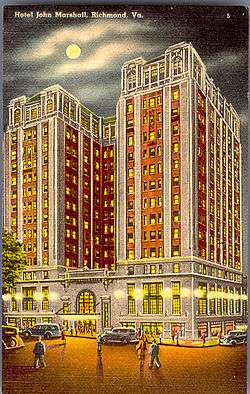Grace Street Commercial Historic District
|
Grace Street Commercial Historic District | |
 Hotel John Marshall, c. 1930s | |
  | |
| Location | Roughly bounded by Adams, Broad, 8th and Franklin Sts.; 626, 700 E. Broad St., 12-118 N. 8th St., 707-715 E. Franklin St., 2-18 and 13 W. Franklin St., Richmond, Virginia |
|---|---|
| Coordinates | 37°32′31″N 77°26′19″W / 37.54194°N 77.43861°WCoordinates: 37°32′31″N 77°26′19″W / 37.54194°N 77.43861°W |
| Area | 48.5 acres (19.6 ha) |
| Built | 1844 |
| Architect | Howell, C.K.; et al. |
| Architectural style | Chicago, Classical Revival, Mission/spanish Revival, Colonial Revival, International Style |
| NRHP Reference # | 98000739, 09000924 (Boundary Increase)[1] |
| VLR # | 127-0857 |
| Significant dates | |
| Added to NRHP | July 13, 1998, November 12, 2009 (Boundary Increase) |
| Designated VLR | December 2, 1997; September 17, 2009[2] |
The Grace Street Commercial Historic District is a national historic district located in Richmond, Virginia. The district encompasses 93 contributing buildings located in downtown Richmond. The buildings reflect the core of the city's early 20th century retail development and the remnants of a 19th-century residential neighborhood. The buildings are in a variety of popular 19th century and early 20th century architectural styles including Classical Revival, Mission Revival, International Style, and Colonial Revival. Notable buildings include the Administration and Equipment Building for the Chesapeake & Potomac Telephone Company (1929), Thalhimer's Department Store, Atlantic Life Building (1950-1959), Miller & Rhoads Department Store, Berry-Burk Building, former W. W. Foster Studios (1927), Bank of Virginia (1949), Investment Realty Company building (1930), W.T. Grant Store (1939), Hotel John Marshall (1927), Franklin Federal Savings and Loan building (1954), and the Tompkins House (1820). Located in the district and separately listed are the Loew's Theatre, Centenary United Methodist Church, Joseph P. Winston House, Central National Bank, and National Theater.[3][4]
It was added to the National Register of Historic Places in 1998, with a boundary increase in 2009.[1]
References
- 1 2 National Park Service (2010-07-09). "National Register Information System". National Register of Historic Places. National Park Service.
- ↑ "Virginia Landmarks Register". Virginia Department of Historic Resources. Retrieved 19 March 2013.
- ↑ Kimberly M. Chen and Douglas Harnsberger (October 1997). "National Register of Historic Places Inventory/Nomination: Grace Street Commercial Historic District" (PDF). Virginia Department of Historic Resources. and Accompanying two photos and Accompanying map Archived 2013-08-13 at the Wayback Machine.
- ↑ Kimberly M. Chen and Melanie A. Moran (n.d.). "National Register of Historic Places Inventory/Nomination: Grace Street Commercial Historic District (Boundary Increase)" (PDF). Virginia Department of Historic Resources.

